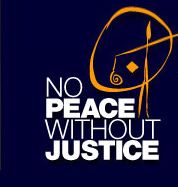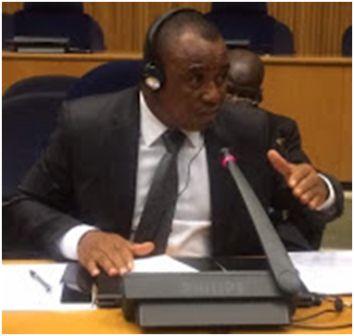NPWJ says farewell to the Special Court for Sierra Leone
with pride in our partnership and gratitude for a job exceptionally well done
Brussels – Rome, 2 December 2013 – In a ceremony held today at its premises in Freetown, Sierra Leone, the Special Court for Sierra Leone (SCSL) formally handed over the Court’s landmark courthouse and the surrounding court complex to the Government of Sierra Leone, as it takes its final steps towards closure of the institution. Niccolo’ Figa Talamanca, Secretary-General of No Peace Without Justice attended the ceremony alongside numerous other guests who have been longtime supporters of the Court, from inside and outside Sierra Leone. Sixteen distinguished jurists were also sworn-in as Judges of the Residual Special Court for Sierra Leone, the institution that will succeed the Special Court when it closes this month.
Statement by Alison Smith, Legal Counsel and Director of the International Criminal Justice Program of No Peace Without Justice:
“On the day that formally marks the closure of the Special Court for Sierra Leone, No Peace Without Justice (NPWJ) and the Nonviolent Radical Party, Transnational and Transparty (NRPTT) acknowledge the remarkable work of this Court, the tremendous impact it has had on the people of Sierra Leone and Liberia and, above all, its historic achievements in the accountability process for the people of Sierra Leone and for international criminal justice world-wide.
“We are proud to have contributed to the establishment and functioning of the Special Court over the last more than twelve years. Back in July 2000, when the Special Court was first conceived, many openly expressed scepticism as to whether it would be an obstacle to peace, whether it would be able to play a role in post-conflict reconstruction and, frankly, whether it was really worth it. We are doubly proud that the Special Court has stood the test of time and proved them all wrong. We saw the Special Court’s potential right from the start, from our secondment of legal advisers to assist the Government, through starting country-wide outreach with civil society before the Court was established including working closely with members of the Sierra Leone legal profession, to the conflict mapping program we implemented with our civil society partners, to gather the stories of what happened throughout the conflict and try to help make some sense of it all. We are proud to have been part of this journey together with so many others, including friends and colleagues in Sierra Leone and at the Special Court; it will always occupy a special place in our hearts and minds.
“It is a great privilege for us to have been there from the very beginning with a body which, through the successful completion of its mandate, brought an essential contribution to Sierra Leone’s long road towards ending impunity for the horrors of the armed conflict committed between 1996 and 2002. Chief among these contributions has been providing justice and redress to the victims and populations affected by it. It has also shown that the rule of law – beloved of many Sierra Leoneans, especially those behind the establishment of the Court – has a place in Sierra Leone, which has had its own impact on the country’s legal and judicial system.
“For this, we would especially pay tribute to the late Robin Vincent, the first Registrar of the SCSL and subsequent Registrars up to Binta Mansaray, the current SCSL Registrar, whose vision has taken the Court through to its successful conclusion. We would also pay tribute to all the SCSL Prosecutors and all its judges; His Excellency Solomon E. Berewa, Attorney-General and Minister of Justice at the time of the SCSL negotiations; Ambassador Allieu I. Kanu, Deputy Permanent Representative of Sierra Leone to the United Nations at the time of the SCSL negotiations; the members of the SCSL Management Committee throughout the years; and all the members of the Special Court Working Group, as it then was, the Coalition for Justice and Accountability as it is now, for the tremendous work done to keep the Special Court on track and in touch with the people of Sierra Leone. The dedication and determination of all of these people, working together, that the SCSL should form an integral part of Sierra Leone’s post-conflict recovery made all the difference and they cannot be thanked nor recognised enough.
“Critically, the final judgement in the trial of Charles Taylor handed down on 26 September 2013 by the Appeals Chamber of the Special Court for Sierra Leone also signalled a major achievement for international criminal justice world-wide. Charles Taylor was the first former head of State whose case has been heard through to the appeals stage by an international tribunal since the Second World War and the Nuremburg trials: this is remarkable in and of itself. More importantly, the decision sent a deterrent and unequivocal message to leaders who at this very moment may be considering committing serious crimes in violation of international law: nobody is above the law and even those at the highest level will be held to account for their actions.
“We would also like to recall that the SCSL’s efforts in reaching out to the people who suffered so much at the hands of those indicted and judged before it remain unparalleled, allowing justice not only to be done, but to be seen to be done by the people of Sierra Leone and Liberia, on the radio, in the newspapers and in the courtrooms. As highlighted by a recent survey (LINK) conducted by NPWJ and its Sierra Leonean and Liberian partners, at the request of the SCSL, the main reason the SCSL had the impact it did was twofold: much of this success can be attributed to the work of the Outreach section and to the vision established during the early stages of the Court of it being an institution embedded in and responsive to the expectations and needs of the people affected by the crimes it was investigating and prosecuting.
“Now that the SCSL has completed its mandate successfully, it is essential that all necessary efforts and measures are carried out to ensure that the SCSL leaves a meaningful and consolidated legacy for justice, reconciliation and the rule of law. This is important not only for the Government and people of Sierra Leone and Liberia, it is also critical for future international criminal justice initiatives in Africa and worldwide, including the International Criminal Court. The Residual Special Court for Sierra Leone, which takes over from the SCSL, is an important tool in ensuring the sustainability of the SCSL’s legacy and ensuring that the SCSL’s ongoing obligations, such as witness protection and management of the archives, are properly fulfilled. It also stands as a reminder and a guardian: do not commit crimes under international law and do not tamper with witnesses, lest you face the justice you seek to deny others.
“The Residual Special Court needs support to consolidate the impact of the Special Court and to ensure its promise lives on long into the future. For this reason, NPWJ and the NRPTT strongly urge the international community, and particularly States who have been friends to Sierra Leone over the years, to ensure that the Residual Special Court has the more than modest funding it needs to fulfil these essential functions and ensure the legacy of the Special Court is not lost to Sierra Leone, the region or the world. This in the end is the most fitting tribute any of us can pay to the Special Court and the very real difference it has made to the lives of so many people in Sierra Leone and beyond.”
No Peace Without Justice and Sierra Leone
NPWJ has a long standing commitment to Sierra Leone, including a wide-ranging program in the country from 2000 to 2004 that was designed to contribute to the accountability process for violations of international criminal law. That program contributed to the establishment and functioning of the Special Court and to strengthening Sierra Leonean society’s ability to address violations of human rights and humanitarian law, with a particular focus on outreach and conflict mapping. In recent years, NPWJ has been working in Sierra Leone on ICC issues, including implementing legislation and holding seminars and round table discussions, and on FGM. NPWJ will continue with its involvement in Sierra Leone to facilitate the government and local stakeholders participating in and influencing the processes for maintaining the rule of law, peace and stability.
For further information, contact Alison Smith by email: asmith@npwj.org or by phone: +32-2-548-3912 or Nicola Giovannini on ngiovannini@npwj.org or +32-2-548-3915. Check also our website www.npwj.org
Stay with Sierra Express Media, for your trusted place in news!
© 2013, https:. All rights reserved.




